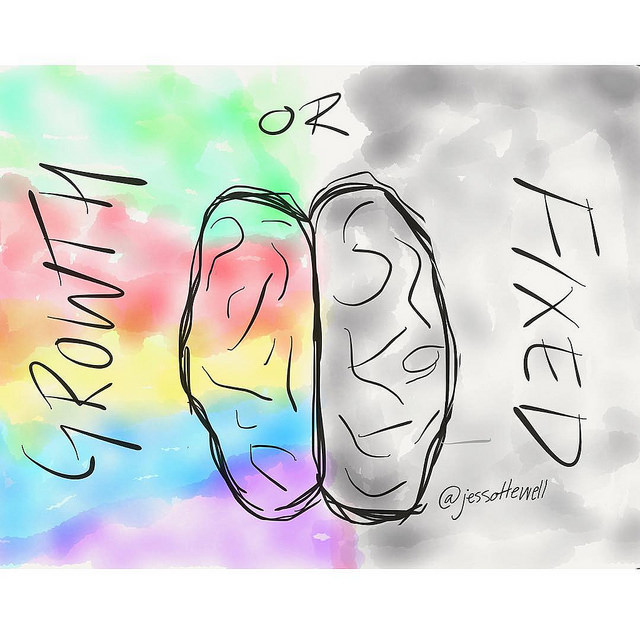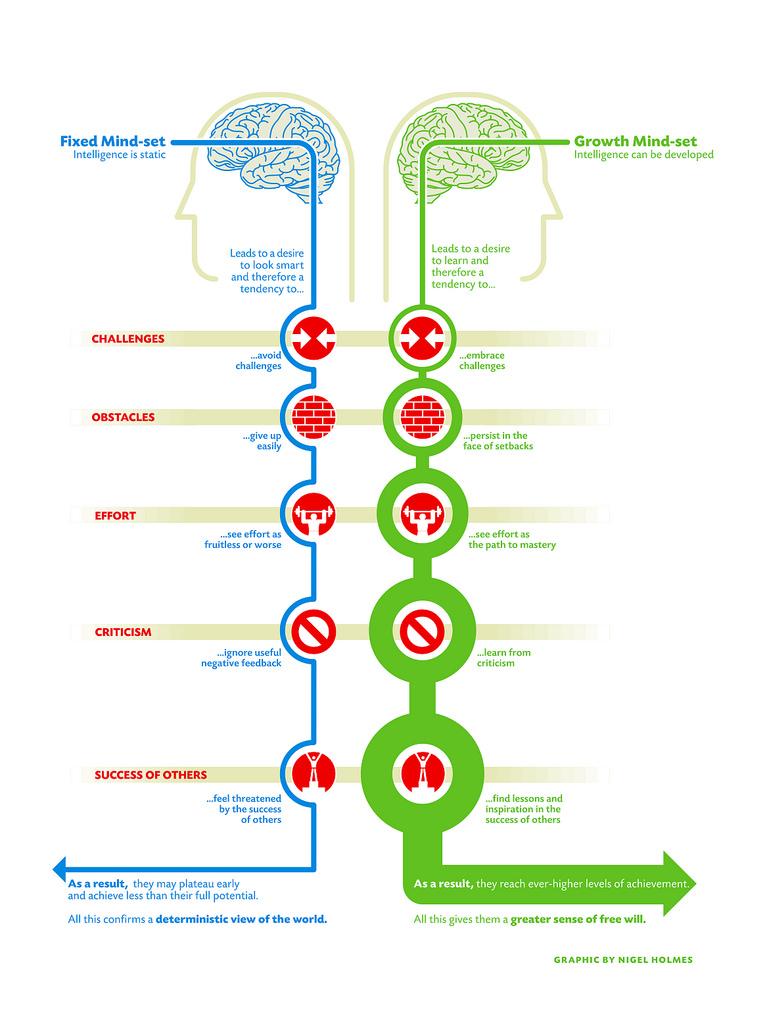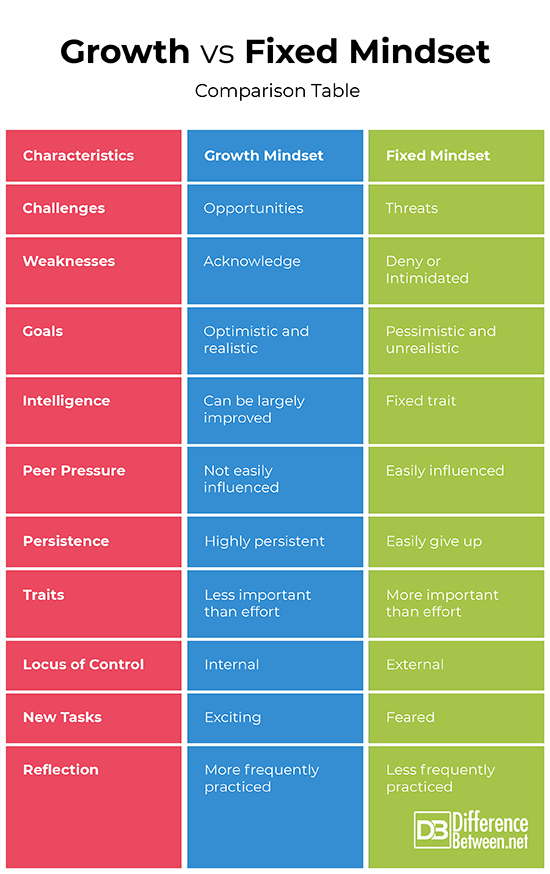Difference Between Growth Mindset and Fixed Mindset
Growth and fixed mindsets are both discussed by Carol Dweck, a researcher on human motivation. Such self-conceptions are crucial in self-regulation and the ability to improve. A fixed mindset entails the belief of static traits and that talent is the key to achievement. On the other hand, a growth mindset involves hard work and the zest for improvement which is correlated with success. The following discussions further look into their distinctions.
What is Growth Mindset?
People with a growth mindset believe that intelligence is something that can be honed overtime. This expectation focuses on the importance of effort and resilience. Dweck further described it as the “power of yet” since it gives the understanding that there is still something that can be done about the current performance. With such perspective, a non-permanent learning curve is emphasized.
The following are some of the tips on how to harness a growth mindset:
-
Look at Difficult Situations as Opportunities
Going through a challenge is a great opportunity to learn.
-
Focus on a Goal
Having a purpose in mind helps in regulating one’s behavior towards a more meaningful end.
-
Determine One’s Unique Learning Style
Being aware of the best way to learn is crucial in selecting the most efficient tools to improve
-
Embrace Weaknesses
Being realistic about one’s limits is important in setting achievable goals.
-
Quality over Quantity
It is better to master a skill than to poorly or averagely learn various skills.
What is Fixed Mindset?
Having a fixed mindset is not helpful in one’s success as it is confined within current abilities. In this belief, people can only be smart if they were born with a high IQ. Hence, it is all about your genetics and given resources. The following are some notable characteristics of those with this mindset:
-
Want to “Appear” Smart
Since they think that being smart is inherent, they are scared to look inadequate.
-
Merely Focus on the “Now” and Not Think of Possibilities
They are stuck in the present since they do not see the improvements that can be achieved after some time and effort.
-
Scared of Challenges
They do not see difficulties as learning experiences and facing challenges may mean losing social approval.
-
Often Compare Themselves with Others
When they feel inadequate, they usually look for others who perform less so they can feel better about themselves.
-
Easily Give Up
They think it is hopeless to be optimistic since success is already predestined.
Differences Between Growth and Fixed Mindset
-
Challenges
A fixed mindset views challenges as threats since it prefers comfort zones while a growth mindset looks at them as opportunities for learning.
-
Weaknesses
People with a growth mindset acknowledge their weaknesses which makes them wiser. By knowing what they have to improve on and their limitations, they can better adjust their learning styles. On the other hand, those with a fixed mindset deny their weaknesses and are often intimidated to do something about them.
-
Goals
Having a growth mindset harnesses optimistic yet realistic goals since you become more comfortable in dealing with your weaknesses. However, having a fixed mindset often leads to pessimistic and/or unrealistic objectives as limitations usually overshadow possibilities.
-
Intelligence
A fixed mindset views intelligence as something pretty much set for each person since it believes that someone is born either smart or stupid. On the other hand, a growth mindset considers the brain as capable of change and thinks of intelligence as largely capable of amelioration.
-
Peer Pressure
Individuals with a fixed mindset often yield in response to peer pressure as they often seek social approval while those with a growth mindset stick to their goals and are largely courageous in not sacrificing their potentials.
-
Persistence
People with a fixed mindset easily give up and they tend to think, “what’s the point?”. On the contrary, those with a growth mindset keep in mind that they have long-term goals which guide their current decisions and efforts.
-
Traits
A fixed mindset puts the spotlight on traits as it assesses a person’s potentials based on inherited characteristics while a growth mindset evaluates aptitudes as founded on experience and practice.
-
Locus of Control
Those with a fixed mindset get swallowed up by their failures and often attribute them to external factors such as luck, weather, and authorities. As for those having a growth mindset, they see failures as enlightening experiences which can make them wiser and they have the empowered view to take control of situations since their locus of control is internal.
-
New Tasks
Having a fixed mindset often leads to fear in response to new tasks since challenges are seen as avenues for downfall. On the contrary, having a growth mindset generates excitement in the face of unfamiliar projects as these are seen as chances for improvement.
-
Reflection
As compared to those with a fixed mindset, those with a growth mindset more often practice reflection on their day to day experiences to maximize their learning.
Growth vs Fixed Mindset: Comparison Table
Summary of Growth vs Fixed Mindset
- A growth mindset focuses on hard work and zest which are correlated with success while a fixed mindset highlights static traits and views mere heritable talents as indicators of achievements.
- Challenges are seen as opportunities by those with growth mindsets while they are viewed as threats by those with fixed mindsets. Hence, new tasks and weaknesses are better embraced by those with more optimistic perspectives.
- Unlike a fixed mindset, a growth mindset sees goals with positive and realistic attitudes. Hence, intelligence can be largely improved through persistence which is less important than traits.
- While the locus of control of a fixed mindset is external, that of a growth mindset is internal. Thus, individuals with the latter framework are not easily influenced by peer pressure and more frequent practice reflection.
- Difference Between Hematoma and Melanoma - February 9, 2023
- Difference Between Bruising and Necrosis - February 8, 2023
- Difference Between Brain Hematoma and Brain Hemorrhage - February 8, 2023
Search DifferenceBetween.net :
1 Comment
Leave a Response
References :
[0]Image credit: https://www.flickr.com/photos/butterseite/2658061277
[1]Image credit: https://www.flickr.com/photos/134717758@N06/19751739181
[2]Dweck, Carol. Summary of Carol S. Dweck’s Mindset. Scotts Valley, CA: CreateSpace Independent Publishing Platform, 2017. Print.
[3]Hildrew, Chris. Becoming a Growth Mindset School. New York, NY: Routledge, 2018. Print.
[4]Ricci, Mary Cay. Mindsets in the Classroom. Austin, TX: Prufrock Press Inc., 2018. Print.




Thats good